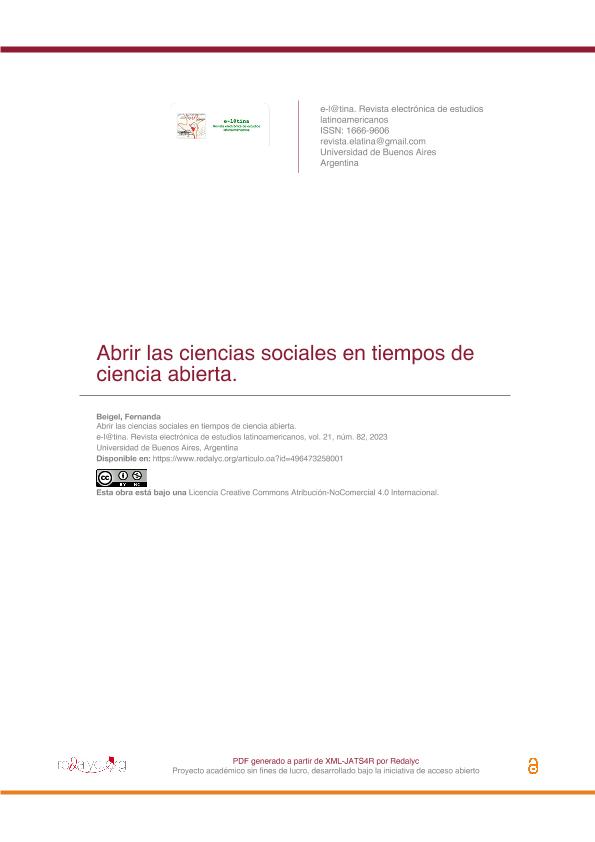Artículo
En este trabajo analizamos estos dos proyectos de apertura desde la perspectiva de América Latina. En la primera parte, revisitamos el programa propuesto por Wallerstein para “abrir las ciencias sociales” y sus principales pilares. Seguidamente, relacionamos este proyecto con la idea de ciencia ciudadana, los principios FAIR y CARE, y la necesidad de avanzar en prácticas de ciencia participativa con justicia infirmacional. Luego, analizamos la ruta latinoamericana de la ciencia abierta y la infraestructura colaborativa que se viene desarrollando desde la década de 1950. Analizamos las condiciones intelectuales, institucionales y políticas que tiene nuestra región para transitar un camino propio de ciencia abierta y en qué medida las ciencias sociales participan del proceso, en qué medida las afecta y/o promueve. Finalmente, se discute el rol crítico que tienen los sistemas de evaluación de la región para producir una transformación de la magnitud que anida en la ciencia abierta, sin subalternizar a las comunidades que participan de a co-producción de conocimientos abiertos. In this paper we analyze, from the perspective of Latin America, two projects that advocate to open the sciences: the first was introduced by Wallerstein in the Report of the Gulbenkian Commission; the second is the open science project, more recently known since the approval of the UNESCO Recommendation on Open Science (2021). In the first part, we revisit the program proposed by Wallerstein to “open the social sciences” and their main pillars. Next, we link this project with the concept of citizen science, the FAIR and CARE principles, and the need to make advances in participatory science practices with informational justice. en, we analyze the Latin American route of open science and the collaborative infrastructure that has been in development since the 1950s. We analyze the intellectual, institutional and political conditions our region has to contend with to tread a path of our own in open science and to which extent social sciences participate in the process, as well as to which extent are they affected and/or promoted by it. Finally, we discuss the critical role that evaluation systems in the region have in producing a transformation of the magnitude possible in open science, without subordinating the communities that participate in the co-production of open knowledge.
Abrir las ciencias sociales en tiempos de ciencia abierta
Título:
Opening the social sciences in times of open science
Fecha de publicación:
01/2023
Editorial:
Universidad de Buenos Aires. Facultad de Ciencias Sociales. Instituto de Investigaciones Gino Germani. Unidad de Docencia e Investigaciones Sociohistóricas de América Latina
Revista:
E-l@tina
ISSN:
1666-9606
Idioma:
Español
Tipo de recurso:
Artículo publicado
Clasificación temática:
Resumen
Palabras clave:
CIENCIA ABIERTA
,
WALLERSTEIN
,
CIENCIA CIUDADANA
,
JUSTICIA INFORMACIONAL
Archivos asociados
Licencia
Identificadores
Colecciones
Articulos(INCIHUSA)
Articulos de INST. DE CS. HUMANAS, SOC. Y AMBIENTALES
Articulos de INST. DE CS. HUMANAS, SOC. Y AMBIENTALES
Citación
Beigel, Maria Fernanda; Abrir las ciencias sociales en tiempos de ciencia abierta; Universidad de Buenos Aires. Facultad de Ciencias Sociales. Instituto de Investigaciones Gino Germani. Unidad de Docencia e Investigaciones Sociohistóricas de América Latina; E-l@tina; 21; 82; 1-2023; 37-57
Compartir




